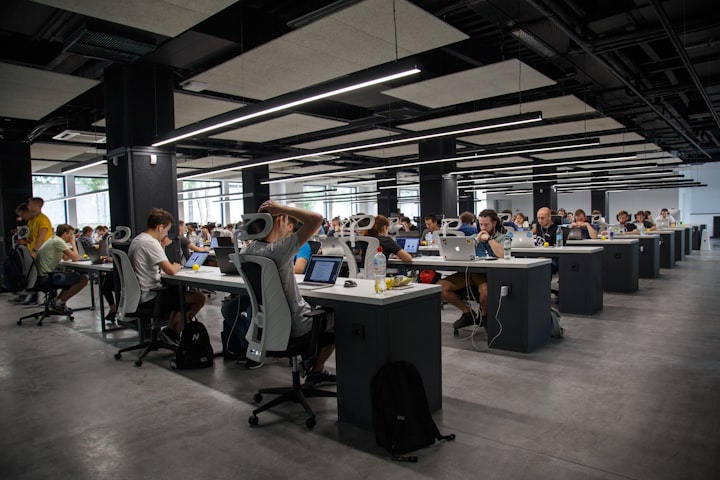The Future of Work: Adapting to the Changing Landscape of the Workplace
Exploring the Trends and Technologies That Are Shaping the Future of Work

The workplace is changing rapidly, driven by technological advancements, demographic shifts, and the evolving needs of businesses and employees. To succeed in the future of work, it is crucial to stay ahead of these changes and adapt to the new landscape of the workplace. In this blog, we will explore the trends and technologies that are shaping the future of work and discuss how businesses and individuals can prepare for the changes ahead.
Remote Work and Flexibility: Remote work and flexible work arrangements have become increasingly popular in recent years, and the COVID-19 pandemic has accelerated this trend. Many businesses have shifted to remote work in response to the pandemic, and this shift is likely to continue in the future. Businesses that offer remote work and flexible work arrangements are better positioned to attract and retain top talent, and employees benefit from increased flexibility and work-life balance.
Artificial Intelligence and Automation: Artificial intelligence (AI) and automation are transforming the way we work. AI-powered technologies such as chatbots and virtual assistants are becoming increasingly common in the workplace, and automation is being used to streamline processes and reduce costs. While these technologies offer many benefits, they also raise concerns about job displacement and the need for reskilling and upskilling.
Gig Economy and Freelancing: The gig economy and freelancing are growing rapidly, offering opportunities for individuals to work independently and businesses to access specialized talent on demand. Freelancing platforms such as Upwork and Fiverr are making it easier for businesses to find and hire freelancers, and more individuals are choosing to work independently to achieve greater autonomy and flexibility.
Sustainability and Corporate Social Responsibility: Sustainability and corporate social responsibility (CSR) are becoming increasingly important in the workplace. Consumers and employees are demanding that businesses take action to address climate change and social issues, and businesses that prioritize sustainability and CSR are more likely to attract and retain customers and employees.
To prepare for the future of work, businesses and individuals need to stay informed about these trends and technologies and adapt to the new landscape of the workplace. Here are some strategies for adapting to the future of work:
Embrace Remote Work and Flexibility: Businesses that offer remote work and flexible work arrangements are better positioned to attract and retain top talent. Individuals can benefit from increased flexibility and work-life balance by seeking out remote work and flexible work arrangements.
Embrace Technology and Upskilling: Technology is transforming the way we work, and businesses and individuals need to stay up to date with the latest technologies and upskill as needed to remain competitive. Businesses should invest in training and development programs for their employees, and individuals should seek out opportunities for reskilling and upskilling to stay relevant in the changing job market.
Embrace Freelancing and Entrepreneurship: The gig economy and freelancing offer opportunities for individuals to work independently and businesses to access specialized talent on demand. Individuals can benefit from greater autonomy and flexibility by pursuing freelancing and entrepreneurship opportunities.
Embrace Sustainability and CSR: Sustainability and CSR are becoming increasingly important in the workplace, and businesses that prioritize these values are more likely to attract and retain customers and employees. Businesses should take action to address climate change and social issues, and individuals can support these efforts by seeking out socially responsible employers and making sustainable choices in their personal lives.
In conclusion, the future of work is rapidly evolving, driven by technological advancements, demographic shifts, and changing business and employee needs. Businesses and individuals that stay informed about the latest trends and technologies and adapt to the new landscape of the workplace will be better positioned to succeed in the future. By embracing remote work and flexibility, technology and upskilling, freelancing and entrepreneurship, and sustainability and CSR, we can prepare for the changes ahead and thrive in the new world of work. The future is exciting and full of possibilities, and those who are able to adapt and embrace change will be the ones who thrive in the years to come.
Prioritizing Diversity and Inclusion: Diversity and inclusion are increasingly recognized as critical factors for success in the workplace. Businesses that prioritize diversity and inclusion are more likely to attract and retain top talent and benefit from a wider range of perspectives and ideas. Individuals can support these efforts by seeking out employers that prioritize diversity and inclusion and advocating for change within their organizations.
Embracing a Hybrid Workplace: The pandemic has accelerated the shift to remote work, but many businesses are now exploring hybrid work arrangements that combine remote work and in-person work. A hybrid workplace offers the benefits of remote work and in-person collaboration, providing increased flexibility and work-life balance while also promoting teamwork and creativity.
Prioritizing Mental Health and Well-being: The pandemic has also brought increased attention to the importance of mental health and well-being in the workplace. Businesses that prioritize mental health and well-being are more likely to have happy and productive employees, and individuals can support these efforts by prioritizing self-care and seeking out employers that prioritize employee well-being.
To sum up, the future of work is a complex and ever-changing landscape. It is essential for businesses and individuals to stay informed and adapt to these changes to thrive in the years to come. By embracing remote work and flexibility, technology and upskilling, freelancing and entrepreneurship, sustainability and CSR, diversity and inclusion, a hybrid workplace, and mental health and well-being, we can prepare for the future of work and succeed in this rapidly changing world.






Comments
There are no comments for this story
Be the first to respond and start the conversation.